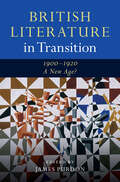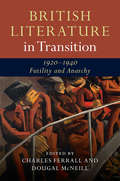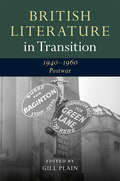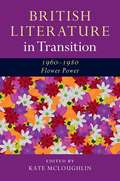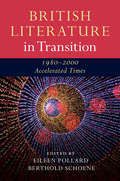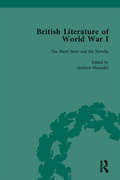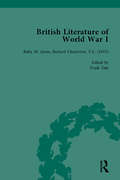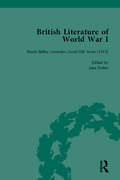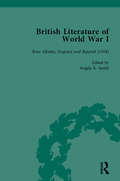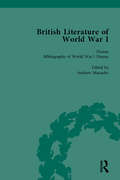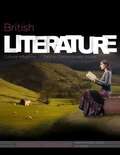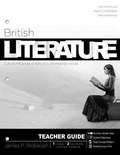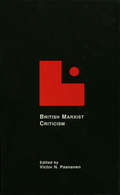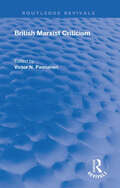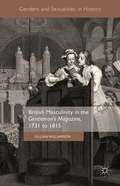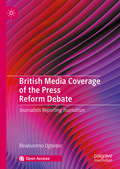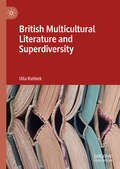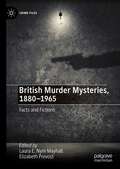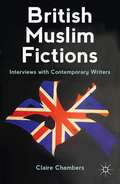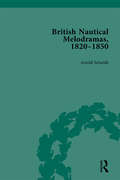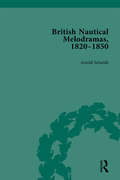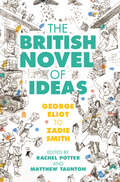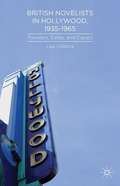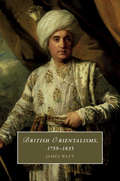- Table View
- List View
British Literature in Transition, 1900–1920: A New Age? (British Literature in Transition)
by James PurdonDuring the first two decades of the twentieth century, Britain's imperial power and influence was at its height. These were years of daring, when adventurers sounded the mysteries of the deep sea and the distant poles, aviators sped through the skies, and new media technologies transformed communication. They were years of social upheaval, during which long-suppressed voices – particularly those of women, of the labouring classes, and of colonial subjects – grew louder and demanded to be heard. They were years of violence, of insurrection and political agitation, and of imperial conflicts that would encompass continents. By subjecting specific developments in literature and related culture to a fine-grained and historically-informed analysis, British Literature in Transition, 1900–1920: A New Age? explores the writing of this extraordinary period in all its complexity and vibrancy.
British Literature in Transition, 1920–1940: Futility and Anarchy (British Literature in Transition)
by Charles Ferrall Dougal McNeillLiterature from the 'political' 1930s has often been read in contrast to the 'aesthetic' 1920s. This collection suggests a different approach. Drawing on recent work expanding our sense of the political and aesthetic energies of interwar modernisms, these chapters track transitions in British literature. The strains of national break-up, class dissension and political instability provoked a new literary order, and reading across the two decades between the wars exposes the continuing pressure of these transitions. Instead of following familiar markers - 1922, the Crash, the Spanish Civil War - or isolating particular themes from literary study, this collection takes key problems and dilemmas from literature 'in transition' and reads them across familiar and unfamiliar cultural works and productions, in their rich and contradictory context of publication. Themes such as gender, sexuality, nation and class are thus present throughout these essays. Major writers such as Woolf are read alongside forgotten and marginalised voices.
British Literature in Transition, 1940–1960: Postwar (British Literature in Transition)
by Gill Plain'Postwar' is both a period and a state of mind, a sensibility comprised of hope, fear and fatigue in which British society and its writers paradoxically yearned both for political transformation and a nostalgic re-instatement of past securities. From the Labour landslide victory of 1945 to the emergence of the Cold War and the humiliation of Suez in 1956, this was a period of radical political transformation in Britain and beyond, but these changes resisted literary assimilation. Arguing that writing and history do not map straightforwardly one onto the other, and that the postwar cannot easily be fitted into the explanatory paradigms of modernism or postmodernism, this book offers a more nuanced recognition of what was written and read in the period. From wartime radio writing to 1950s travellers, cold war poetry to radical theatre, magazine cultures to popular fiction, this volume examines important debates that animated postwar Britain.
British Literature in Transition, 1960–1980: Flower Power (British Literature in Transition)
by Kate McLoughlinThis volume traces transitions in British literature brought about by the rapid, momentous and far-reaching changes of the 1960s and 1970s, illuminating a diverse range of authors, texts, genres and movements. It looks at innovations in form, considering experimental poetry, fiction and drama, and explores the literature of emergent identities in race, gender, sexuality and class. It considers changes in attitudes and in the mind itself: the growth of environmentalism, perceptions of the past, psychedelia, the sexual revolution, and information control. It examines local and regional developments, visiting Wales, Scotland, Northern Ireland and northern England. Finally, it focuses on shifts within the oeuvres of individual authors - two poets, two dramatists and a novelist: Philip Larkin and Ted Hughes, Harold Pinter and Caryl Churchill, and Iris Murdoch.
British Literature in Transition, 1980–2000: Accelerated Times (British Literature in Transition)
by Eileen Pollard Berthold SchoeneThe literature of twentieth-century Britain's final twenty years represents a crash course in transitional history. In the aftermath of the 1970s, the nation's hopes of becoming more efficient were high, leading to the fundamental domestic shake-up that was Margaret Thatcher's neoliberal revolution (1979–90). Following the end of the Cold War, Europe was undergoing radical rejuvenation, while the world as a whole began to thrive on new levels of connectivity and proximity brought through rapid advances in communication technology. Later, in the 1990s, Britons were asked to countenance not only internal devolution, but also the crystallisation of a brand-new European and global order. This volume shows how British literature recorded contemporaneous historical change. It traces the emergence and evolution of literary trends as well as enduring transitional shifts in genre, tone, style and thematic preoccupation.
British Literature of World War I, Volume 1
by Andrew Maunder Angela K Smith Jane Potter Trudi TateGiven the popular and scholarly interest in the First World War it is surprising how little contemporary literary work is available. This five-volume reset edition aims to redress this balance, making available an extensive collection of newly-edited short stories, novels and plays from 1914–19.
British Literature of World War I, Volume 2
by Trudi Tate Jane Potter Andrew Maunder Angela K SmithGiven the popular and scholarly interest in the First World War it is surprising how little contemporary literary work is available. This five-volume reset edition aims to redress this balance, making available an extensive collection of newly-edited short stories, novels and plays from 1914–19.
British Literature of World War I, Volume 3
by Trudi Tate Jane Potter Andrew Maunder Angela K SmithGiven the popular and scholarly interest in the First World War it is surprising how little contemporary literary work is available. This five-volume reset edition aims to redress this balance, making available an extensive collection of newly-edited short stories, novels and plays from 1914–19.
British Literature of World War I, Volume 4
by Andrew Maunder Angela K Smith Jane Potter Trudi TateGiven the popular and scholarly interest in the First World War it is surprising how little contemporary literary work is available. This five-volume reset edition aims to redress this balance, making available an extensive collection of newly-edited short stories, novels and plays from 1914–19.
British Literature of World War I, Volume 5
by Trudi Tate Jane Potter Andrew Maunder Angela K SmithGiven the popular and scholarly interest in the First World War it is surprising how little contemporary literary work is available. This five-volume reset edition aims to redress this balance, making available an extensive collection of newly-edited short stories, novels and plays from 1914–19.
British Literature-Student
by James P. StobaughEnjoy beloved classics while developing vocabulary, reading, and critical thinking skills! Each literature book in the series is a one-year course Each chapter has five lessons with daily concept-building exercises, warm-up questions, and guided readings Easy-to-use with suggested reading schedules and daily calendar Equips students to think critically about philosophy and trends in culture, and articulate their views through writing A well-crafted presentation of whole-book or whole-work selections from the major genres of classic literature (prose, poetry, and drama), each course has 34 chapters representing 34 weeks of study, with an overview of narrative background material on the writers, their historical settings, and worldview. The rich curriculum's content is infused with critical thinking skills, and an easy-to-use teacher's guide outlines student objectives with each chapter, providing the answers to the assignments and weekly exercises. The final lesson of the week includes both the exam, covering insights on the week's chapter, as well as essays developed through the course of that week's study, chosen by the educator and student to personalize the coursework for the individual learner.
British Literature-Teacher
by James P. StobaughEnjoy beloved classics while developing vocabulary, reading, and critical thinking skills! Each literature book in the series is a one-year course Each chapter has five lessons with daily concept-building exercises, warm-up questions, and guided readings Easy-to-use with suggested reading schedules and daily calendar Equips students to think critically about philosophy and trends in culture, and articulate their views through writing A well-crafted presentation of whole-book or whole-work selections from the major genres of classic literature (prose, poetry, and drama), each course has 34 chapters representing 34 weeks of study, with an overview of narrative background material on the writers, their historical settings, and worldview. The rich curriculum's content is infused with critical thinking skills, and an easy-to-use teacher's guide outlines student objectives with each chapter, providing the answers to the assignments and weekly exercises. The final lesson of the week includes both the exam, covering insights on the week's chapter, as well as essays developed through the course of that week's study, chosen by the educator and student to personalize the coursework for the individual learner.
British Marxist Criticism (Wellesley Studies in Critical Theory, Literary History and Culture #22)
by Victor N. PaananenBritish Marxist Criticism provides selective but extensive annotated bibliographies, introductory essays, and important pieces of work from each of eight British critics who sought to explain literary production according to the principles of Marxism.
British Marxist Criticism (Wellesley Studies In Critical Theory, Literary History And Culture Ser. #22)
by Victor N. PaananenBritish Marxist Criticism provides selective but extensive annotated bibliographies, introductory essays, and important pieces of work from each of eight British critics who sought to explain literary production according to the principles of Marxism.
British Masculinity in the Gentleman's Magazine, 1731 to 1815 (Genders And Sexualities In History Ser.)
by Gillian WilliamsonThe Gentleman's Magazine was the leading eighteenth-century periodical. By integrating the magazine's history, readers and contents this study shows how 'gentlemanliness' was reshaped to accommodate their social and political ambitions.
British Media Coverage of the Press Reform Debate: Journalists Reporting Journalism
by Binakuromo OgbeborThis open access book provides a detailed exploration of the British media coverage of the press reform debate that arose from the News of the World phone hacking scandal and the Leveson Inquiry. Gathering data from a content analysis of 870 news articles, Ogbebor shows how journalists cover debates on media policy and illustrates the impact of their coverage on democracy. Through this analysis, the book contributes to knowledge of paradigm repair strategies; public sphere; gatekeeping theory; the concept of journalism as an interpretive community; political economy of the press; as well as the neoliberal and social democratic interpretations of press freedom. Providing insight into factors inhibiting and aiding the role of the news media as a democratic public sphere, it will be a valuable resource for the press, media reform activists, members of the public, and academics in the fields of journalism, politics and law.
British Multicultural Literature and Superdiversity
by Ulla RahbekThis book explores contemporary British multicultural multi-genre literature. Considering socio-political and philosophical ideas about British multiculturalism, superdiversity and conviviality, Ulla Rahbek studies a broad range of texts by writers from across the majority-minority divide. The text focuses on figurative registers and metaphorical richness in multicultural poetry and investigates the interlocked issue of recognition, representation and identity in memoirs. Rahbek analyses how twenty-first-century British multicultural novels both envision and reimagine an inclusive nation and thematise the detrimental effects of individual exclusion on characters’ pursuits of the good life. She observes the ways that short stories pivot on ambivalent encounters and intercultural dialogue, and she reflects on the public good of multicultural literature.
British Murder Mysteries, 1880-1965: Facts and Fictions (Crime Files)
by Laura E. Nym Mayhall Elizabeth PrevostBritish Murder Mysteries, 1880-1965: Facts and Fictions conceptualizes detective fiction as an archive, i.e., a trove of documents and sources to be used for historical interpretation. By framing the genre as a shifting set of values, definitions, and practices, the book historicizes the contested meanings of analytical categories like class, race, gender, nation, and empire that have been applied to the forms and functions of detection. Three organizing themes structure this investigation: fictive facticity, genre fluidity, and conservative modernity. This volume thus shows how British detective fiction from the late-nineteenth to the mid-twentieth century both shaped and was shaped by its social, cultural, and political contexts and the lived experience of its authors and readers at critical moments in time.
British Muslim Fictions
by Claire ChambersThrough interviews with leading writers (including Ahdaf Soueif and Hanif Kureishi), this book analyzes the writing and opinions of novelists of Muslim heritage based in the UK. Discussion centres on writers' work, literary techniques, and influences, and on their views of such issues as the hijab, the war on terror and the Rushdie Affair.
British Nautical Melodramas, 1820–1850: Volume III
by Arnold SchmidtDuring the 1820s and 30s nautical melodramas "reigned supreme" on London stages, entertaining the mariners and maritime workers who comprised a large part of the audience for small theatres with the same sentimental moments and comic interludes of domestic melodrama mixed with patriotic images that communicated and reinforced imperial themes. However, generally the study of British theatre history moves from medieval and renaissance plays directly to the realism and naturalism of late Victorian and modern drama. Readers typically encounter a gap between Restoration and eighteenth-century plays like those of Oliver Goldsmith and Richard Brinsley Sheridan, and late-nineteenth plays by Henrik Ibsen and Oscar Wilde. Nineteenth-century drama, with the possible exception of plays by Byron, Shelley, and Wordsworth, remains all but invisible. Until recently, melodramatic plays written and performed during this "gap" received little scholarly attention, but their value as reflections of Britain’s promulgation of imperial ideology — and its role in constructing and maintaining class, gender, and racial identities — have given discussions of melodrama force and momentum. The plays in included in these three volumes have never appeared in a critical anthology and most have not been republished since their original nineteenth-century editions. Each play is transcribed from the original documents and includes an author biography, a headnote about the play itself, full annotations with brief definitions of unfamiliar vocabulary, and explanatory notes. Comprehensive editorial apparatus details the nineteenth-century imperial, naval, political, and social history relevant to the plays’ nautical themes, as well as discussing nineteenth-century theatre history, melodrama generally, and the nautical melodrama in particular. Contemporary theatre practices — acting, audiences, staging, lighting, special effects — are also examined. An extensive bibliography of primary and secondary texts; a complete index; and contemporary images of the actors, theatres, stage sets, playbills, costumes, and locales have been compiled to aid study further. The appendices include maps of Britain, Europe, and the East and West Indies.
British Nautical Melodramas, 1820–1850: Volume II
by Arnold SchmidtDuring the 1820s and 30s nautical melodramas "reigned supreme" on London stages, entertaining the mariners and maritime workers who comprised a large part of the audience for small theatres with the same sentimental moments and comic interludes of domestic melodrama mixed with patriotic images that communicated and reinforced imperial themes. However, generally the study of British theatre history moves from medieval and renaissance plays directly to the realism and naturalism of late Victorian and modern drama. Readers typically encounter a gap between Restoration and eighteenth-century plays like those of Oliver Goldsmith and Richard Brinsley Sheridan, and late-nineteenth plays by Henrik Ibsen and Oscar Wilde. Nineteenth-century drama, with the possible exception of plays by Byron, Shelley, and Wordsworth, remains all but invisible. Until recently, melodramatic plays written and performed during this "gap" received little scholarly attention, but their value as reflections of Britain’s promulgation of imperial ideology — and its role in constructing and maintaining class, gender, and racial identities — have given discussions of melodrama force and momentum. The plays in included in these three volumes have never appeared in a critical anthology and most have not been republished since their original nineteenth-century editions. Each play is transcribed from the original documents and includes an author biography, a headnote about the play itself, full annotations with brief definitions of unfamiliar vocabulary, and explanatory notes. Comprehensive editorial apparatus details the nineteenth-century imperial, naval, political, and social history relevant to the plays’ nautical themes, as well as discussing nineteenth-century theatre history, melodrama generally, and the nautical melodrama in particular. Contemporary theatre practices — acting, audiences, staging, lighting, special effects — are also examined. An extensive bibliography of primary and secondary texts; a complete index; and contemporary images of the actors, theatres, stage sets, playbills, costumes, and locales have been compiled to aid study further. The appendices include maps of Britain, Europe, and the East and West Indies.
British Nautical Melodramas, 1820–1850: Volume I
by Arnold SchmidtDuring the 1820s and 30s nautical melodramas "reigned supreme" on London stages, entertaining the mariners and maritime workers who comprised a large part of the audience for small theatres with the same sentimental moments and comic interludes of domestic melodrama mixed with patriotic images that communicated and reinforced imperial themes. However, generally the study of British theatre history moves from medieval and renaissance plays directly to the realism and naturalism of late Victorian and modern drama. Readers typically encounter a gap between Restoration and eighteenth-century plays like those of Oliver Goldsmith and Richard Brinsley Sheridan, and late-nineteenth plays by Henrik Ibsen and Oscar Wilde. Nineteenth-century drama, with the possible exception of plays by Byron, Shelley, and Wordsworth, remains all but invisible. Until recently, melodramatic plays written and performed during this "gap" received little scholarly attention, but their value as reflections of Britain’s promulgation of imperial ideology — and its role in constructing and maintaining class, gender, and racial identities — have given discussions of melodrama force and momentum. The plays in included in these three volumes have never appeared in a critical anthology and most have not been republished since their original nineteenth-century editions. Each play is transcribed from the original documents and includes an author biography, a headnote about the play itself, full annotations with brief definitions of unfamiliar vocabulary, and explanatory notes. Comprehensive editorial apparatus details the nineteenth-century imperial, naval, political, and social history relevant to the plays’ nautical themes, as well as discussing nineteenth-century theatre history, melodrama generally, and the nautical melodrama in particular. Contemporary theatre practices — acting, audiences, staging, lighting, special effects — are also examined. An extensive bibliography of primary and secondary texts; a complete index; and contemporary images of the actors, theatres, stage sets, playbills, costumes, and locales have been compiled to aid study further. The appendices include maps of Britain, Europe, and the East and West Indies.
The British Novel of Ideas: George Eliot to Zadie Smith
by Rachel Potter Matthew TauntonThe novel of ideas is an important form that is both under-theorised and largely neglected in accounts of the development of the novel in the twentieth and twenty-first centuries. This book sets out the history of this critical hostility, which took hold as the aesthetic protocols of literary modernism became established among key literary tastemakers in Britain. It then proposes a revaluation and a critical reclamation of the novel of ideas, showcasing a range of perceptive, sympathetic, and sensitive ways of reading novels in which discursive argumentation is foregrounded and where the clash of ideas is vital to the novelistic effect. Through thematic chapters as well as new accounts of key novelists in the British tradition-including George Eliot, H. G. Wells, Doris Lessing and Kamila Shamsie-this book repositions the novel of ideas as a major form in modern British literature.
British Novelists in Hollywood, 1935-1965: Travelers, Exiles, and Expats
by Lisa CollettaBritish Novelists in Hollywood, 1935-1965 calls attention to the shifting grounds of cultural expression by highlighting Hollywood as a site that unsettled definitions and narratives of colonialism and national identity for prominent British novelists such as Christopher Isherwood, P. G. Wodehouse, Evelyn Waugh, and J. B. Priestley.
British Orientalisms, 1759–1835 (Cambridge Studies in Romanticism #126)
by James WattHow did Britons understand their relationship with the East in the late eighteenth and early nineteenth centuries? James Watt's new study remaps the literary history of British Orientalisms between 1759, the 'year of victories' in the Seven Years' War, and 1835, when T. B. Macaulay published his polemical 'Minute on Indian Education'. It explores the impact of the war on Britons' cultural horizons, and the different and shifting ways in which Britons conceived of themselves and their nation as 'open' to the East across this period. Considering the emergence of new forms and styles of writing in the context of an age of empire and revolution, Watt examines how the familiar 'Eastern' fictions of the past were adapted, reworked, and reacted against. In doing so he illuminates the larger cultural conflict which animated a nation debating with itself about its place in the world and relation to its others.
